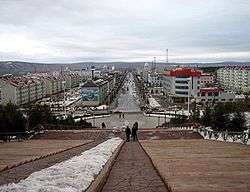Mohe County
| Mohe County 漠河县 | |
|---|---|
| County | |
 | |
.png) Location of the county (pink) in Daxing'anling Prefecture (yellow) and Heilongjiang | |
| Coordinates: 52°58′N 122°32′E / 52.967°N 122.533°ECoordinates: 52°58′N 122°32′E / 52.967°N 122.533°E | |
| Country | People's Republic of China |
| Province | Heilongjiang |
| Prefecture | Daxing'anling |
| County seat | Xilinji (西林吉镇) |
| Area | |
| • Total | 18,233 km2 (7,040 sq mi) |
| Elevation | 435 m (1,427 ft) |
| Population | |
| • Total | 83,465 |
| • Density | 4.6/km2 (12/sq mi) |
| Time zone | China Standard (UTC+8) |
| Postal code | 165300 |
| Website | http://www.hlmohe.gov.cn/ |
Mohe County (simplified Chinese: 漠河县; traditional Chinese: 漠河縣; pinyin: Mòhé Xiàn) is a county of Heilongjiang province, and is the northernmost Chinese county. It is under the administration of the Daxing'anling Prefecture. The county is named after the Mohe, a Tungusic people of ancient Manchuria. A village, the northernmost Chinese settlement, at the latitude of 53° 29' N known as the "Beiji Village" (北极村, literally "Northernmost") lies in this county, on the Amur River, which forms the border with Russia's Amur Oblast and Zabaykalsky Krai. Here, the astronomical phenomenon of aurora borealis attracts domestic and foreign tourists to this village.[1]
Geography and climate
Mohe is located in the far northwest of Heilongjiang. It is located at latitude 52° 10'−53° 33' N and 121° 07'−124° 20' E. It forms a border with Russia's Amur Oblast and Zabaykalsky Krai, where the Amur River flows for 245 kilometres (152 mi). The county spans 150 kilometres (93 mi) from north to south and has a total area of 18,233 square kilometres (7,040 sq mi), occupying 21.6% of the prefecture's (Daxing'anling) area and 3.9% of the provincial (Heilongjiang) area. This creates a population density of only 4.64 persons/km2 (12.0 persons/sqmi).
Mohe, by virtue of its far northern location, is one of the few locations in China with a subarctic climate (Köppen Dwc), with long, severe winters, and short, warm summers. Winter begins in early to mid-October and lasts until late April, and temperatures then are normally the coldest nationwide. Average temperatures stay below freezing for a total of nearly seven months of the year, and the frost-free period is just short of 90 days; in addition, the diurnal temperature variation is large, averaging 15.9 °C (28.6 °F) annually. The monthly 24-hour average temperature ranges from −29.8 °C (−21.6 °F) in January to 18.4 °C (65.1 °F) in July, with an annual mean of −4.29 °C (24.3 °F), so that the county is only a little south of the line of continuous permafrost. Extreme temperatures have ranged from −52.3 °C (−62 °F) to 39.3 °C (103 °F).[2]
| Climate data for Mohe County (1971−2000) | |||||||||||||
|---|---|---|---|---|---|---|---|---|---|---|---|---|---|
| Month | Jan | Feb | Mar | Apr | May | Jun | Jul | Aug | Sep | Oct | Nov | Dec | Year |
| Record high °C (°F) | −4.8 (23.4) |
−0.1 (31.8) |
16.2 (61.2) |
24.6 (76.3) |
35.1 (95.2) |
36.8 (98.2) |
38.0 (100.4) |
34.2 (93.6) |
29.5 (85.1) |
23.0 (73.4) |
8.5 (47.3) |
−3.2 (26.2) |
39.3 (102.7) |
| Average high °C (°F) | −21.5 (−6.7) |
−13 (9) |
−3.1 (26.4) |
7.7 (45.9) |
17.5 (63.5) |
24.2 (75.6) |
25.8 (78.4) |
23.1 (73.6) |
16.4 (61.5) |
5.1 (41.2) |
−10.6 (12.9) |
−21.2 (−6.2) |
4.2 (39.6) |
| Average low °C (°F) | −36.2 (−33.2) |
−33.1 (−27.6) |
−24.3 (−11.7) |
−7.5 (18.5) |
0.3 (32.5) |
7.5 (45.5) |
11.7 (53.1) |
9.4 (48.9) |
1.4 (34.5) |
−9.9 (14.2) |
−25.3 (−13.5) |
−34 (−29) |
−11.7 (11.0) |
| Record low °C (°F) | −49.6 (−57.3) |
−47.6 (−53.7) |
−42.7 (−44.9) |
−32.6 (−26.7) |
−13.1 (8.4) |
−3.2 (26.2) |
−0.9 (30.4) |
−1 (30) |
−12.2 (10) |
−28.7 (−19.7) |
−41.7 (−43.1) |
−48.5 (−55.3) |
−52.3 (−62.1) |
| Average precipitation mm (inches) | 5.0 (0.197) |
4.4 (0.173) |
6.9 (0.272) |
23.8 (0.937) |
32.9 (1.295) |
67.6 (2.661) |
99.1 (3.902) |
107.2 (4.22) |
50.1 (1.972) |
15.7 (0.618) |
12.5 (0.492) |
7.4 (0.291) |
432.6 (17.03) |
| Average precipitation days (≥ 0.1 mm) | 7.6 | 5.7 | 4.6 | 7.7 | 9.3 | 14.9 | 16.2 | 16.2 | 11.6 | 5.6 | 8.7 | 9.3 | 117.4 |
| Source: Weather China, all-time record high and low[2] | |||||||||||||
Transportation
Mohe Railway Station (漠河站), opened in 1972, is the northernmost railway station in China. It has regular passenger service to Harbin, Qiqihar and Shenyang.[3]
Mohe Gulian Airport, opened 2008, is the nation's northernmost airport.
Sources
- ↑ Xinhua, accessed 1, July 2010.
- 1 2 Extreme Temperatures Around the World - world highest lowest temperatures. Accessed 2010-11-02
- ↑ Mohe train schedule (Chinese)
External links
- Mohe County People's Government website (Chinese)